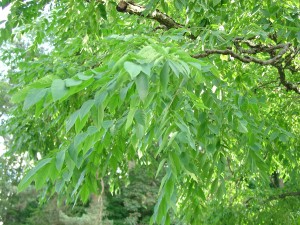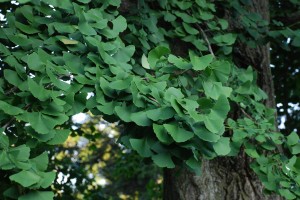Some tree species are dioecious, that is produce single sex flowers (either male and female). Male flowers produce pollen and no fruits. Female flowers bear seeds or fruits. You may purchase male clones to avoid picking up messy seed pods or capsules in the fall. If you are allergic to certain tree pollens, avoid planting dioecious male trees.
Most popular of dioecious landscape shrubs are the hollies (Ilex spp.). In holly world many cultivars (varieties) seem to be specially “married” to one another. Gardeners may select female plants for their colorful fruits in fall and winter. Holly fruits may be red, yellow or white colored depending on the cultivar. Be certain that the correct pollinating variety has been planted nearby the specific female cultivar(s). For example, the male clone ‘Apollo’ will pollinate primarily ‘Sparkleberry’ female hollies.
Over the years male clones of several landscape trees have come to dominate our yards and gardens. Male fruitless types do not litter the ground with messy pulpy fruits and seed pods. Ginkgo is one such example. Female ginkgoes produce foul smelling apricot looking fruits. When the ripened fruits fall on sidewalks, the area around them reeks a horrible odor. Male ginkgoes produce no fruits and male clones are grafted by nurseries.
You may run into a third, slightly confusing group are “Polygamo-dioecious” species. This means the male and female flowers grow on separate trees, but occasionally produce perfect flowers on each tree as well. Best examples are certain species and varieties of Maples (Acer spp.), Honeylocust (Gleditsia triacanthos) and Spicebush (Lindera benzoin). These maple types produce few or no fruits in most years.
List of Dioecious Species:
Certain maples -example: boxelder maple (Acer negundo)
Tree of Heaven (Ailanthus altissima)
Japanese aucuba (Aucuba japonica)
Bittersweet (Celastrus scandens)
Plum yew (Cephalotaxus harringtonia)
Katsura tree (Cercidiphyllum japonicum)
Fringetree (Chionanthus spp.)
Smoke tree (Cotinus coggygria)
Persimmon (Diospyros virginiana)
Hardy Rubber Tree (Eucommia ulmoides)
Ash tree (Fraxinus spp.)
Ginkgo, maidenhair tree (Ginkgo biloba)
Honeylocust (Gleditsia triacanthos)
Holly (Ilex spp.)
Juniper (Juniperus spp.)
Spicebush (Lindera benzoin)
Osage orange (Maclura pomifera)
Mulberry (Morus spp.)
Bayberry (Myrica pennsylvania)
Amur Cork Tree (Phellodendron amurense)
Podocarpus (Podocarpus macrophyllus)
Poplar or Aspen (Populus spp.)
Willow (Salix spp.)
Yew (Taxus spp.)
Stinking Cedar (Torreya taxifolia)



 Posted in
Posted in 
